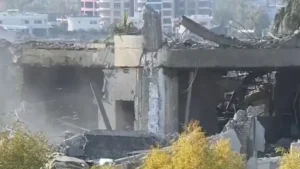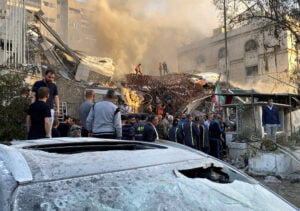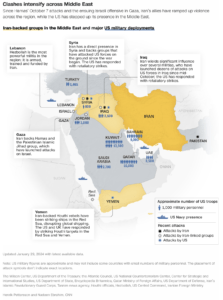Why did the Iran-Israel war start?
Tensions between Israel and Iran have escalated following an Israeli airstrike on Iran’s consulate in Syria, which killed several top Iranian officials. In retaliation, Iran launched a massive attack on Israel, firing over 300 drones and missiles from its own territory and through allied forces in Iraq, Yemen, and Lebanon. However, Israel’s advanced air defense systems, supported by the U.S. and other allies, intercepted nearly all of the projectiles, preventing widespread damage. Despite the attack, Israel remained largely unscathed, with minimal casualties and disruption.
The long-standing hostility between Israel and Iran has intensified due to recent events, including Israel’s war against Hamas, which Iran supports. Israel’s Western allies, including the U.S., have urged caution, warning against a full-scale war and advising Israel to view the successful defense as a strategic win. While hardliners in Israel’s government are pushing for a strong retaliation, the Israeli war cabinet is still debating its response. Iran, meanwhile, has warned that any Israeli counterattack will be met with even greater force.
As the situation unfolds, the world is on edge, hoping to prevent further escalation in an already volatile region.

Why did the Iran-Israel war start?
The rivalry between Iran and Israel has lasted for decades, but recent events have pushed tensions to dangerous new levels. The latest escalation began in April 2024, when Israel reportedly bombed Iran’s consulate in Damascus, Syria. The strike killed senior Iranian military officials, including commanders of the elite Revolutionary Guard. Iran viewed the attack as a direct assault on its sovereignty, as diplomatic facilities are traditionally protected under international law.
Vowing revenge, Iran launched an unprecedented barrage of drones and missiles at Israel just weeks later—marking the first time Iran directly targeted Israeli territory from its own soil.
How Did Iran Strike Back?
On April 13, Iran carried out a massive, coordinated assault involving over 300 drones, ballistic missiles, and rockets. The attack included:
170 drones (slow-moving but capable of overwhelming defenses)
120+ ballistic missiles (high-speed weapons that are harder to intercept)
Additional rockets fired by Iran-backed groups in Iraq, Yemen, and Lebanon, including Hezbollah
Despite the scale of the attack, Israel—with support from the U.S., Britain, France, and Jordan—intercepted 99% of the threats using advanced defense systems like the Iron Dome. Only a few missiles caused minor damage to an Israeli airbase. This successful defense underscored Israel’s military capabilities and the crucial role of its allies.

Roots of the Rivalry
Iran and Israel were once allies, but their relationship collapsed after Iran’s 1979 Islamic Revolution. Since then, the two nations have clashed indirectly through proxy conflicts and covert operations. Several key factors fuel their hostility:
Iran’s support for anti-Israel groups: Tehran arms and funds Hamas in Gaza, Hezbollah in Lebanon, and Houthi rebels in Yemen, all of whom oppose Israel.
Israel’s strikes on Iranian targets: Israel has frequently attacked Iran-linked sites in Syria and has sabotaged Iran’s nuclear program through cyberattacks and assassinations.
The nuclear dispute: Israel sees Iran’s nuclear ambitions as an existential threat, while Iran insists its program is for peaceful purposes.
The October 7 Hamas attack on Israel, which killed 1,200 people, further escalated tensions. Israel’s subsequent war in Gaza drew sharp criticism from Iran and its allies. However, the Damascus consulate strike was the breaking point, pushing Iran to retaliate openly rather than relying on proxy forces.
Global Reactions: Calls for Restraint
World leaders scrambled to prevent a wider war following Iran’s attack. U.S. President Joe Biden praised Israel’s defense but urged Prime Minister Benjamin Netanyahu to “take the win” and avoid retaliation. The G7 nations condemned Iran’s aggression and vowed to help stabilize the Middle East. Even Arab states like Jordan and Saudi Arabia, which have historically had tense relations with Israel, assisted in intercepting missiles—signaling their concern over regional instability.
Iran, meanwhile, declared the matter “concluded” but warned of a “devastating” response if Israel retaliates. For now, both sides seem to be carefully weighing their next steps.

You must be logged in to post a comment.